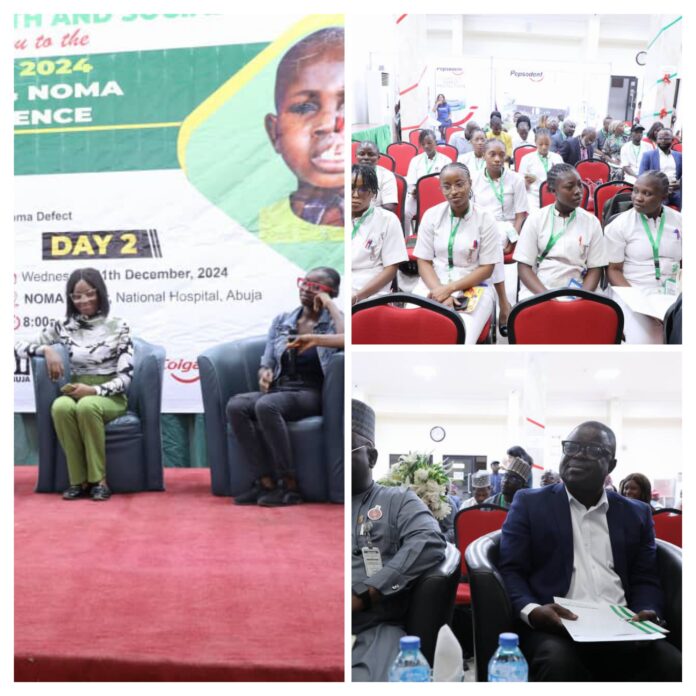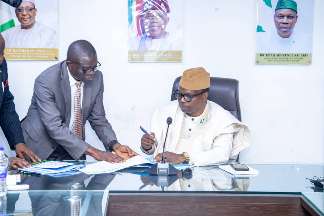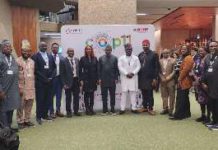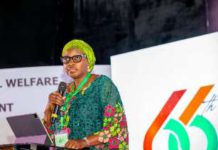By Joy Odor
The Federal Government, through the Ministry of Health and Social Welfare, has engaged the services of medical experts, traditional healers, and various stakeholders in its fight against Noma and other oral diseases in the country.
This was disclosed by the Minister of State for Health and Social Welfare, Dr. Salako Isiaq Salako, represented by Dr. Jimoh Salaudeen, while addressing stakeholders who convened in Abuja on Tuesday to commemorate the 2024 National Oral Health Day/Noma Day and Scientific Conference.
This year’s theme, “Listing of Noma as Neglected Tropical Disease: What Next?” emphasized the urgent need for collective action against Noma.
Dr. Salako described Noma, which stems from severe malnutrition and leads to disfigurement and even death if untreated, as an acute public health concern primarily affecting malnourished children aged 2 to 6 years.
“It rapidly eats away the soft and hard tissues of the face, often leaving individuals with poor cosmetic outcomes,” he cautioned, urging heightened awareness and proactive measures.
The Minister highlighted the criticality of oral health in overall well-being, stating, “Your mouth is a mirror that reflects your overall health and well-being.
“A healthy smile is not just a reflection of our physical appearance, but also an indicator of our overall health.”
He stressed the linkage between oral diseases and broader health challenges, mentioning that compromised oral health often leads to severe pain and social isolation.
To address Noma and other oral health diseases effectively, Dr. Salako disclosed that the government has initiated numerous interventions, including the establishment of Noma treatment centers, such as those within the National Hospital Complex and in Sokoto State.
He revealed that a revised National Oral Health Policy was launched on July 3, 2024, aimed specifically at enhancing the management and prevention of Noma.
“The Dentistry Division is now positioned to lead in all forms of management and prevention of oral health diseases.”
In a call to action, Dr. Salako urged healthcare workers and traditional healers to collaborate in grassroots level training focused on early detection and treatment.
“We are working with stakeholders to engage in programs to strengthen workforce capabilities, ensuring that healthcare providers are adequately equipped to address oral health challenges,” he stated.
The gathering also celebrated Nigeria’s recent achievement in securing WHO’s recognition of Noma as a neglected tropical disease, an effort that was made possible through collaboration among the Federal Ministry of Health, critical stakeholders, and a Technical Working Group (TWG) dedicated to combating Noma.
“I am pleased to inform you that Nigeria played a significant role in this listing,” said Dr. Salaudeen, emphasizing the collective effort that garnered support from 33 countries during discussions at the United Nations World Health Assembly.
Earlier in his welcome address, the Permanent Secretary Health, Daju Kachollum who was represented by the Director, Specialty Hospital, Dr Azeez Aderemi, echoed the urgency of combating Noma, stating, “The burden of Noma is heavy but not insurmountable.”
He emphasized the importance of sharing knowledge and best practices among healthcare professionals, policymakers, and community leaders.
“Our gathering today brings together healthcare professionals, policy makers, community leaders and advocates all united by a common goal to eradicate Noma and improve oral health.
“By sharing knowledge, best practices, and innovative solutions, we can significantly reduce the incident of Noma and enhance the quality of life for those affected.
“I want to express my sincere heartfelt gratitude to all the organizers, sponsors and participants who have made this event possible, your dedication and commitment are truly inspiring. Together we can create a future where Noma is no longer a threat to our children and community,” Daju noted.
The Permanent Secretary added that the current administration is also determined to combat Noma by addressing malnutrition, which has been identified as the major risk factor of the disease.
“The government is also collaborating with organizations such as Noma Aid Nigeria Initiative and Médecins Sans Frontières (MSF), to provide treatment and rehabilitation for Noma patients.
Currently in Nigeria, there are multifaceted public health actions to decrease Noma and other oral diseases through educating communities about the causes, symptoms and prevention of Noma and other oral health diseases.
“The government is addressing malnutrition which is the key risk factor of Noma through the nutritional program and food security initiative of the Renewed Hope Agenda of President Bola Ahmed Tinubu,” he said.
Also, in his goodwill message, the Country Representative of Médecins Sans Frontières (MSF), Dr. Simba Tirima, noted the need for integrated surveillance systems to monitor Noma cases and prevent further incidents.
“Early detection and timely treatment remain critical to saving lives,” he said, emphasizing the importance of addressing the socio-economic drivers of Noma, including poverty and malnutrition.
As the conference progresses, participants aim to foster lasting solutions to not only eradicate Noma but also elevate overall oral health standards across Nigeria.
“Together, we can transform the story of Noma from one of despair to one of hope, resilience, and triumph,” Dr. Tirima concluded.
One of the highlights of the event was the short drama presentation by the nursing students of Yagongwo College of Nursing, Kuje, Abuja.
The drama aimed at sensitizing citizens on the need to give Noma disease the needed medical attention, rather than ignorantly tagging it a spiritual attack.
















